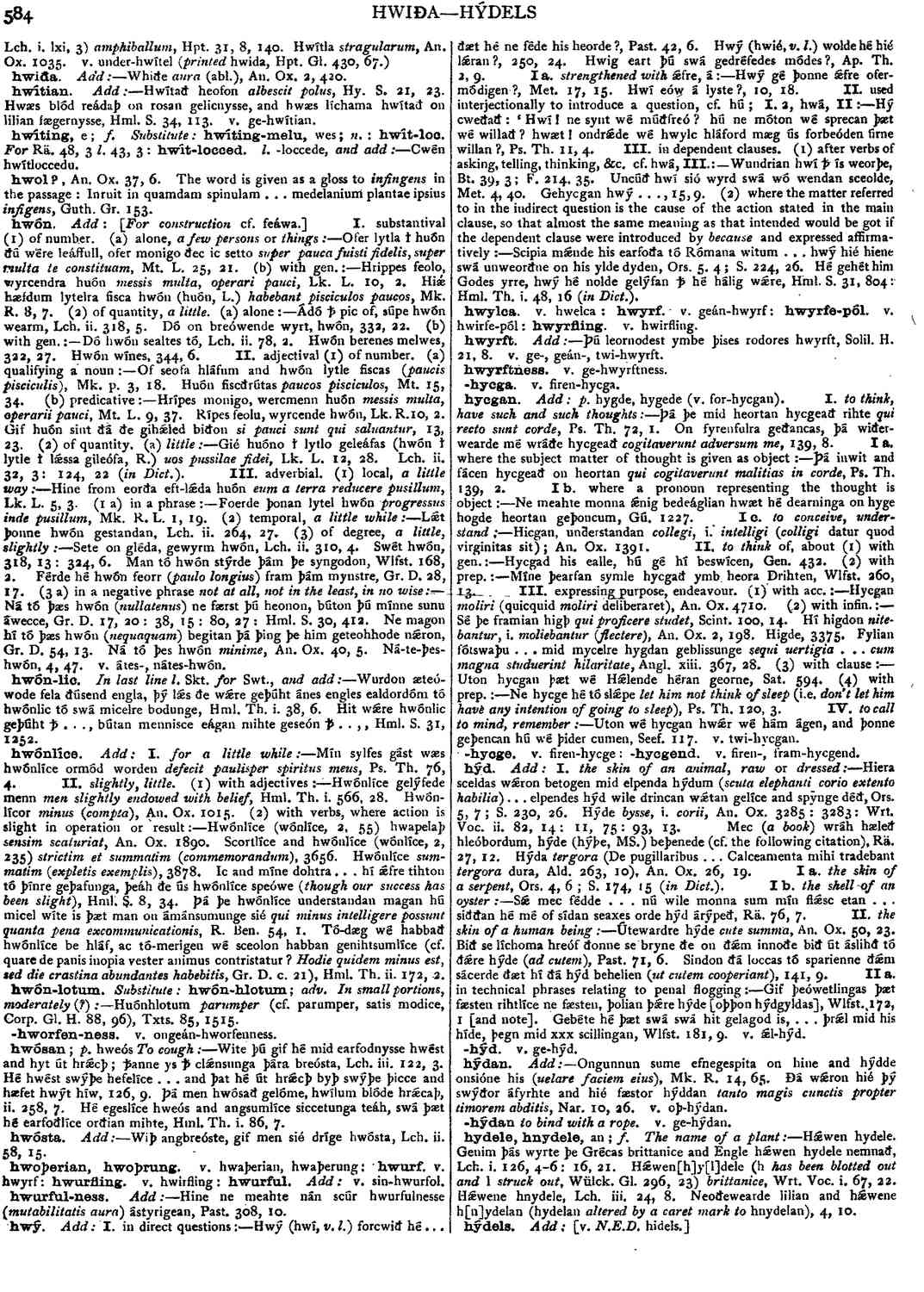hwón
-
Ofer lytla ł huón ðú wére leáffull, ofer monigo ðec ic setto
super pauca fuisti fidelis, super multa te constituam
,- Mt. L. 25, 21.
-
Hrippes feolo, wyrcendra huón
messis multa, operari pauci
,- Lk. L. 10, 2.
-
Hiǽ hæfdum lytelra fisca hwón (huón, L.)
habebant pisciculos paucos
,- Mk. R. 8, 7.
-
Ádó ꝥ pic of, súpe hwón wearm,
- Lch. ii. 318, 5.
-
Dó on breówende wyrt, hwón,
- 332, 22.
-
Dó hwó;n sealtes tó,
- Lch. ii. 78, 2.
-
Hwón berenes melwes,
- 322, 27.
-
Hwón wínes,
- 344, 6.
-
Of seofa hláfum and hwón lytle fiscas (
paucis pisciculis
),- Mk. p. 3, 18.
-
Huón fiscðrútas
paucos pisciculos
,- Mt. 15, 34.
-
Hrípes monigo, wercmenn huón
messis multa, operarii pauci
,- Mt. L. 9, 37.
-
Rípes feolu, wyrcende hwón,
- Lk. R. 10, 2.
-
Gif huón sint ðá ðe gihǽled biðon
si pauci sunt qui saluantur
,- 13, 23.
-
Gié huóno ł lytlo geleáfas (hwón ł lytle ł lǽssa gileófa, R.)
uos pussilae fidei,
- Lk. L. 13, 28.
- Lch. ii. 32, 3: 124, 22 (in Dict.).
-
Hine from eorða eft-lǽda huón eum a terra reducere pusillum, Lk. L. 5, 3. (1 a) in a phrase :-- Foerde þonan lytel hwón
progressus inde pusillum
,- Mk. R. L. 1. 19.
-
Lǽt þnne hwón gestandan,
- Lch. ii. 264, 27,
-
Sete on gléda, gewyrm hwón,
- Lch. ii. 310, 4.
-
Swét hwón,
- 318, 13 : 324, 6.
-
Man tó hwón stýrde þám þe syngodon,
- Wlfst. 168, 2.
-
Férde hé hwón feorr (
paulo longius) fram þám mynstre, Gr. D. 28, 17. (3 a) in a negative phrase not at all, not in the least, in no wise :-- Ná tó þæs hwón (nullatenus )
ne færst þú heonon, búton þú mínne sunu áwecce,- Gr. D. 17, 20 : 38, 15 : 80, 27 : Hml. S. 30, 412.
-
Ne magon hí tó þæs hwón (
nequaquam
) begitan þá þing þe him geteohhode nǽron,- Gr. D. 54, 13.
-
Ná tó þes hwón
minime
,- An. Ox. 40, 5.
-
Ná-te-þes-hwón,
- 4, 47.
- v. átes-hwón, nátes-hwón.
Bosworth, Joseph. “hwón.” In An Anglo-Saxon Dictionary Online, edited by Thomas Northcote Toller, Christ Sean, and Ondřej Tichy. Prague: Faculty of Arts, Charles University, 2014. https://bosworthtoller.com/53630.
Checked: 0